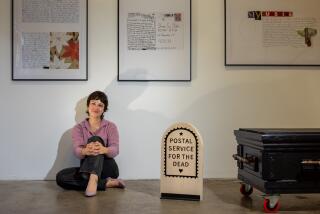Book review: ‘A Secret Gift’ by Ted Gup
- Share via
“A Secret Gift
How One Man’s Kindness — and a Trove of Letters — Revealed the Hidden History of the Great Depression”
Ted Gup
Penguin Press:
368 pp., $25.95
On Dec. 18, 1933, an ad appeared in the Canton, Ohio, paper offering financial aid for 50 to 75 families to help them have “a merry and joyous Christmas.” The benefactor asked simply that the applicants write of their “true circumstances” — and, when the letters arrived, felt compelled to help twice as many. Before Santa arrived, $5 checks from B. Virdot — as the paper noted, a pseudonym — reached 150 people. Virdot’s identity remained a secret for 75 years, until his grandson, Ted Gup, opened a suitcase to discover a bankbook and the cache of letters.
They could hardly have landed in better hands. Gup, a former Washington Post reporter who now chairs the journalism department at Emerson College in Boston, dived into public records to trace what happened to the recipients of his grandfather’s generosity-and to their children and grandchildren. When he could, he interviewed the families connected to those long-ago, modest gifts. In telling their stories, the book becomes a portrait of endurance and recovery, as well as of a community in the throes of the Great Depression.
Before the stock market crash of 1929, Canton was a busy industrial city in , home to Hoover and Republic Steel. But it was kneecapped by the Depression, with unemployment running as high as 50%. Local banks failed, taking all the deposits with them. Assistance programs there frequently ran out of food. Malnourished children in homes their parents couldn’t afford to heat got sick; some died.
The devastation hit all levels: the people who received $5 from B. Virdot included a grocer who’d gone broke extending credit to his customers, and a man who lost his family’s mansion after putting it up as collateral for the farm machinery business he had inherited.
The letters, many of which are reproduced in full, are snapshots telling desperate stories they wouldlater downplay or deliberately forget. “We do not own a home here, nor furniture, tho we once did,” wrote Edith Saunders. “Recently we were unable to pay any rent for five weeks and were ordered to move.” Ora Beggs, who’d been sick after losing a son the year before, explains, “We do have a large Dr. bill at Dr. Maxwell, a hospital bill, grocery at Mr. Brown’s on Navarre rd. The last two I have been paying a dollar on whenever possible. Also owe $16 at Jacobs funeral home yet.”
The Beggs family moved to the country, where they had no indoor plumbing but could at least raise their own food. Son Don, now in his 80s, remembers getting a paper route — and selling chickens and rabbits to the people who could afford them. The necessary grimness of these true stories is leavened by the long view — the septuagenarians who remember the local amusement park, the boy who grows up to fight bravely in World War II, the grandchildren safe from want.
In his letter, Howard Sommers detailed the efforts he and his wife made to earn money, including picking wild dandelions and selling them door to door. “Please destroy this letter,” he writes, “so no one will know but you & I.” That pact of secrecy — between the authors and the anonymous B. Virdot — was key to their frankness.
In chapters that alternate with the letters and their legacy, Gup weaves the story of B. Virdot. Initially, Gup wanted to understand why his grandfather undertook this singular act of generosity, but he found himself exploring why he invented B. Virdot at all That exploration led to a stack of secret upon secret, which Gup fans out like a deck of cards.
B. Virdot, the man Gup knew as Sam Stone, was born Sam Finkelstein in Romania, although he maintained otherwise. Driven by anti-Semitism, the family emigrated to the U.S., landing in Pittsburgh. Apparently to deny the legacy of his abusive father, Sam shed his last name and reinvented himself as man who, eventually, was able to make his way in Canton as a successful businessman. Hampered by the cratering economy and the troubled family he foreswore, Stone’s path to success was never assured. “As Sam Stone learned more than once,” Gup writes, “the bright line that separated the favored class from those below them could dissolve almost overnight, exposing the fragile divide between the haves and have-nots.”
The last two years have proved that to be the case all over again. But after the Great Depression, the U.S. learned how to take care of its people: bBank deposits are insured, and our network of social services, if imperfect, is far more robust. Even the unfortunateare living in comparatively fortunate times.
The letters, Gup writes, “reminded me of the difference between discomfort and misery, between the complaints of consumers forced to rein in their spending and the keening of parents whose children went hungry night after night.” They also show that a gesture of generosity can deliver, along with small relief, good fortune that rings with hope.
More to Read
The biggest entertainment stories
Get our big stories about Hollywood, film, television, music, arts, culture and more right in your inbox as soon as they publish.
You may occasionally receive promotional content from the Los Angeles Times.











